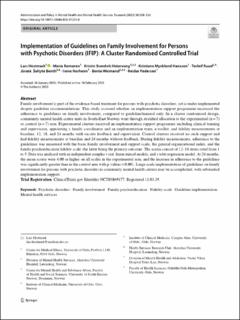| dc.contributor.author | Hestmark, Lars | |
| dc.contributor.author | Romøren, Maria | |
| dc.contributor.author | Heiervang, Kristin Sverdvik | |
| dc.contributor.author | Hansson, Kristiane Myckland | |
| dc.contributor.author | Ruud, Torleif | |
| dc.contributor.author | Saltyte Benth, Jurate | |
| dc.contributor.author | Norheim, Irene | |
| dc.contributor.author | Weimand, Bente Margrethe | |
| dc.contributor.author | Pedersen, Reidar | |
| dc.date.accessioned | 2024-01-09T13:05:11Z | |
| dc.date.available | 2024-01-09T13:05:11Z | |
| dc.date.created | 2023-03-17T12:58:29Z | |
| dc.date.issued | 2023 | |
| dc.identifier.citation | Administration and Policy in Mental Health and Mental Health Services Research. 2023, 50 520-533. | en_US |
| dc.identifier.issn | 0894-587X | |
| dc.identifier.uri | https://hdl.handle.net/11250/3110645 | |
| dc.description.abstract | Family involvement is part of the evidence-based treatment for persons with psychotic disorders, yet is under-implemented despite guideline recommendations. This study assessed whether an implementation support programme increased the adherence to guidelines on family involvement, compared to guideline/manual only. In a cluster randomised design, community mental health centre units in South-East Norway went through stratified allocation to the experimental (n = 7) or control (n = 7) arm. Experimental clusters received an implementation support programme including clinical training and supervision, appointing a family coordinator and an implementation team, a toolkit, and fidelity measurements at baseline, 12, 18, and 24 months with on-site feedback and supervision. Control clusters received no such support and had fidelity measurements at baseline and 24 months without feedback. During fidelity measurements, adherence to the guidelines was measured with the basic family involvement and support scale, the general organizational index, and the family psychoeducation fidelity scale, the latter being the primary outcome. The scales consist of 12–14 items rated from 1 to 5. Data was analysed with an independent samples t-test, linear mixed models, and a tobit regression model. At 24 months, the mean scores were 4.00 or higher on all scales in the experimental arm, and the increase in adherence to the guidelines was significantly greater than in the control arm with p-values < 0.001. Large-scale implementation of guidelines on family involvement for persons with psychotic disorders in community mental health centres may be accomplished, with substantial implementation support. | en_US |
| dc.language.iso | eng | en_US |
| dc.rights | Navngivelse 4.0 Internasjonal | * |
| dc.rights.uri | http://creativecommons.org/licenses/by/4.0/deed.no | * |
| dc.title | Implementation of Guidelines on Family Involvement for Persons with Psychotic Disorders (IFIP): A Cluster Randomised Controlled Trial | en_US |
| dc.type | Peer reviewed | en_US |
| dc.type | Journal article | en_US |
| dc.description.version | publishedVersion | en_US |
| cristin.ispublished | true | |
| cristin.fulltext | original | |
| cristin.qualitycode | 1 | |
| dc.identifier.doi | 10.1007/s10488-023-01255-0 | |
| dc.identifier.cristin | 2134774 | |
| dc.source.journal | Administration and Policy in Mental Health and Mental Health Services Research | en_US |
| dc.source.volume | 50 | en_US |
| dc.source.pagenumber | 520-533 | en_US |

